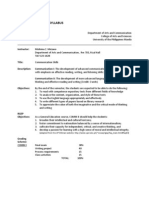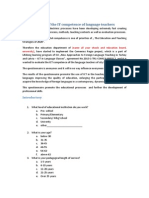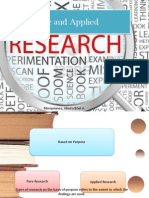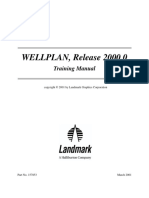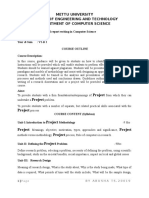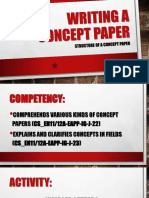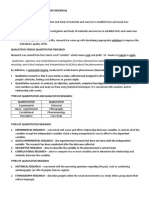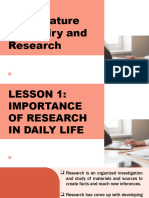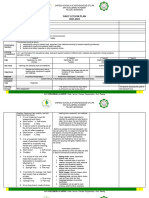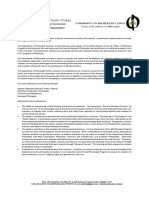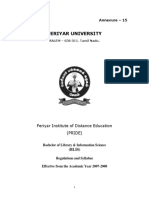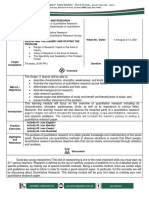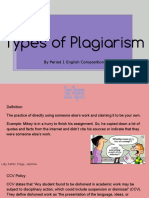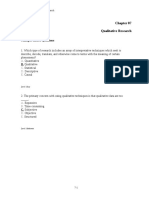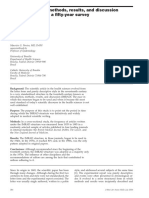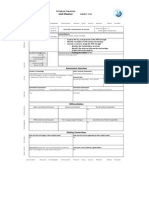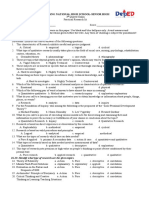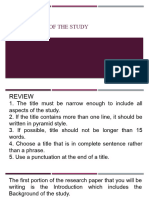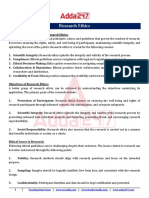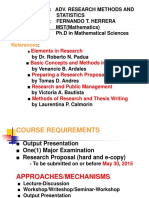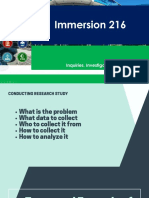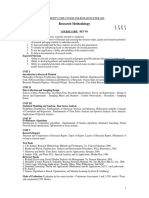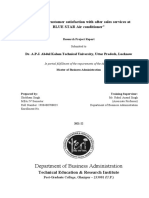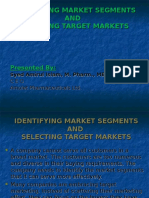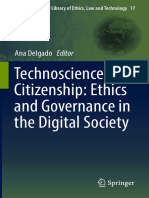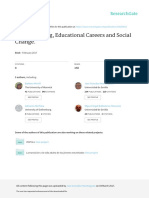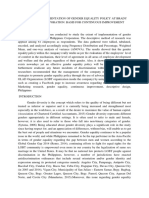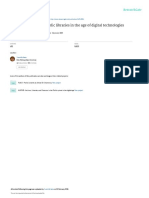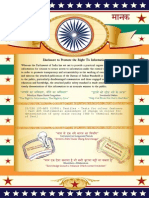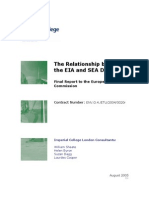0 ratings0% found this document useful (0 votes)
1K viewsResearch Methodology - Syllabus
Research Methodology - Syllabus
Uploaded by
Vandana ReddyThis document outlines a university core course on research methodology. The course aims to help students gain insights into scientific research, critically review literature, and learn basic statistics for data presentation and analysis. It covers topics like research design, data collection and sampling, statistical modeling, time series analysis, and evolutionary algorithms. Students will learn to develop hypotheses, evaluate current research, and communicate their results. The course expects students to be able to critically analyze complex research issues and propose new directions for further work. It will also teach documenting research reports in a structured format.
Copyright:
© All Rights Reserved
Available Formats
Download as DOC, PDF, TXT or read online from Scribd
Research Methodology - Syllabus
Research Methodology - Syllabus
Uploaded by
Vandana Reddy0 ratings0% found this document useful (0 votes)
1K views1 pageThis document outlines a university core course on research methodology. The course aims to help students gain insights into scientific research, critically review literature, and learn basic statistics for data presentation and analysis. It covers topics like research design, data collection and sampling, statistical modeling, time series analysis, and evolutionary algorithms. Students will learn to develop hypotheses, evaluate current research, and communicate their results. The course expects students to be able to critically analyze complex research issues and propose new directions for further work. It will also teach documenting research reports in a structured format.
Original Description:
RM SYLLABUS VIT VELLORE
Copyright
© © All Rights Reserved
Available Formats
DOC, PDF, TXT or read online from Scribd
Share this document
Did you find this document useful?
Is this content inappropriate?
This document outlines a university core course on research methodology. The course aims to help students gain insights into scientific research, critically review literature, and learn basic statistics for data presentation and analysis. It covers topics like research design, data collection and sampling, statistical modeling, time series analysis, and evolutionary algorithms. Students will learn to develop hypotheses, evaluate current research, and communicate their results. The course expects students to be able to critically analyze complex research issues and propose new directions for further work. It will also teach documenting research reports in a structured format.
Copyright:
© All Rights Reserved
Available Formats
Download as DOC, PDF, TXT or read online from Scribd
Download as doc, pdf, or txt
0 ratings0% found this document useful (0 votes)
1K views1 pageResearch Methodology - Syllabus
Research Methodology - Syllabus
Uploaded by
Vandana ReddyThis document outlines a university core course on research methodology. The course aims to help students gain insights into scientific research, critically review literature, and learn basic statistics for data presentation and analysis. It covers topics like research design, data collection and sampling, statistical modeling, time series analysis, and evolutionary algorithms. Students will learn to develop hypotheses, evaluate current research, and communicate their results. The course expects students to be able to critically analyze complex research issues and propose new directions for further work. It will also teach documenting research reports in a structured format.
Copyright:
© All Rights Reserved
Available Formats
Download as DOC, PDF, TXT or read online from Scribd
Download as doc, pdf, or txt
You are on page 1of 1
UNIVERSITY CORE COURSE FOR RESEARCH SCHOLARS
Research Methodology
L T P C
3 0 0 3
COURSE CODE: RES 701
Objectives
1. To gain insights into how scientific research is conducted.
2. To help in critical review of literature and assessing the research trends, quality and extension potential
of research and equip students to undertake research.
3. To learn and understand the basic statistics involved in data presentation.
4. To identify the influencing factor or determinants of research parameters.
5. To test the significance, validity and reliability of the research results.
6. To help in documentation of research results.
Expected Outcome
1. Ability to critically evaluate current research and propose possible alternate directions for further work
2. Ability to develop hypothesis and methodology for research
3. Ability to comprehend and deal with complex research issues in order to communicate their scientific
results clearly for peer review.
UNIT I
Introduction to Research Methods
Philosophy of Science, Evolutionary Epistemology, Scientific Methods, Hypotheses Generation and Evaluation,
Code of Research Ethics, Definition and Objectives of Research, Various Steps in Scientific Research, Types of
Research; Research Purposes - Research Design - Survey Research - Case Study Research.
UNIT II
Data Collection and Sampling Design
Sources of Data: Primary Data, Secondary Data; Procedure Questionnaire- Survey and Experiments Design of
Survey and Experiments - Sampling Merits and Demerits - Control Observations - Procedures - Sampling
Errors.
UNIT III
Statistical Modeling and Analysis, Time Series Analysis
Probability Distributions, Fundamentals of Statistical Analysis and Inference, Multivariate methods, Concepts of
Correlation and Regression, Fundamentals of Time Series Analysis and Spectral Analysis, Error Analysis,
Applications of Spectral Analysis.
UNIT IV
Evolutionary Algorithms
Introduction to evolutionary algorithms - Fundamentals of Genetic algorithms, Simulated Annealing, Neural
Network based optimization, Optimization of fuzzy systems.
UNIT V
Research Reports
Structure and Components of Research Report, Types of Report, Layout of Research Report, Mechanism of
writing a research report
Text Book
1. C.R. Kothari, Research Methodology Methods and Techniques, 2/e, Vishwa Prakashan, 2006.
2. Bendat and Piersol, Random data: Analysis and Measurement Procedures, Wiley Interscience, 2001.
3. Shumway and Stoffer, Time Series Analysis and its Applications, Springer, 2000.
4. Jenkins, G.M., and Watts, D.G., Spectral Analysis and its Applications, Holden Day, 1986.
Reference Books
1. Richard I Levin amp; David S.Rubin, Statistics for Management, 7/e. Pearson Education, 2005.
2. Donald R. Cooper, Pamela S. Schindler, Business Research Methods, 8/e, Tata McGraw-Hill Co. Ltd., 2006.
3. Fuzzy Logic with Engg Applications, Timothy J.Ross, Wiley Publications, 2nd Ed[d]
4. Simulated Annealing: Theory and Applications (Mathematics and Its Applications, by P.J. van Laarhoven&
E.H. Aarts[e]
5. Genetic Algorithms in Search, Optimization, and Machine Learning by David E. Goldberg[
You might also like
- Comm I-II SyllabusDocument7 pagesComm I-II SyllabusRia Mikhaella PanisNo ratings yet
- Course SyllabusDocument7 pagesCourse SyllabusChi BieNo ratings yet
- Questionnaire - It CompetenceDocument5 pagesQuestionnaire - It Competenceapi-242513470No ratings yet
- Pure and Applied ResearchDocument12 pagesPure and Applied ResearchcallielizzaNo ratings yet
- Well PlanDocument450 pagesWell PlanazeazeazeNo ratings yet
- A Study On Consumer Behavior Towards Sales Promotion On Colgate Toothpaste at Gomti Nagar Area in Luccknow CityDocument39 pagesA Study On Consumer Behavior Towards Sales Promotion On Colgate Toothpaste at Gomti Nagar Area in Luccknow CityChandanNo ratings yet
- ThesisDocument108 pagesThesisAmina K. KhalilNo ratings yet
- Inquiries, Investigation, and Immersion: Finding The Answers To The Research Questions (Data Analysis Method)Document15 pagesInquiries, Investigation, and Immersion: Finding The Answers To The Research Questions (Data Analysis Method)Princess Georgie Rose RodelasNo ratings yet
- MPhil Course Outlines SPR 22Document12 pagesMPhil Course Outlines SPR 22iqra ehsanNo ratings yet
- RRL ActivityDocument5 pagesRRL Activityjoeisa presbiteroNo ratings yet
- Research MethodologyDocument2 pagesResearch Methodologyaliyi ahmedNo ratings yet
- CHAPTER3-RESEARCHMETHODOLOGY DatacollectionmethodandResearchtools PDFDocument10 pagesCHAPTER3-RESEARCHMETHODOLOGY DatacollectionmethodandResearchtools PDFAhmad DanielNo ratings yet
- Course OutlineDocument2 pagesCourse OutlineDagim AbaNo ratings yet
- Writing A Concept Paper StructureDocument37 pagesWriting A Concept Paper StructureAivee YambaoNo ratings yet
- Hard Copy Practical Research PDFDocument6 pagesHard Copy Practical Research PDFJoemmel MagnayeNo ratings yet
- 01 - Thesis and Capstone Project Quick Outline V3.0Document2 pages01 - Thesis and Capstone Project Quick Outline V3.0Ian Dave D. EjercitoNo ratings yet
- PR1 Week1Document28 pagesPR1 Week1Rence Matthew AustriaNo ratings yet
- 3 MBA519A Research MethodologyDocument3 pages3 MBA519A Research MethodologyShreelekha NavaleNo ratings yet
- Nature of Inquiry and ResearchDocument33 pagesNature of Inquiry and ResearchJoshua VicenteNo ratings yet
- BLIS. Library Information ScienceDocument13 pagesBLIS. Library Information ScienceRam kumarNo ratings yet
- DAILY LESSON PLAN in TLE 7Document13 pagesDAILY LESSON PLAN in TLE 7mangaoitjessaNo ratings yet
- Identifying The Inquiry and Stating The ProblemDocument29 pagesIdentifying The Inquiry and Stating The ProblemJamaica PrincipeNo ratings yet
- m2 Characteristics of ResearchDocument20 pagesm2 Characteristics of Researchivanjoshpangan455No ratings yet
- PHL 105 - Lazaro PDFDocument2 pagesPHL 105 - Lazaro PDFLin GuillermoNo ratings yet
- Lesson Plan in English 5Document5 pagesLesson Plan in English 5Cyrille Irish QuejadaNo ratings yet
- RPS RM in ELT - Iroh 17 January 2022Document20 pagesRPS RM in ELT - Iroh 17 January 2022Alamsyah Dafio100% (1)
- Soal Yang Udah DibikinDocument6 pagesSoal Yang Udah DibikinPanji KasatriaNo ratings yet
- Scope and DelimitationDocument22 pagesScope and DelimitationJulieta Carcole0% (1)
- BLISDocument51 pagesBLISarulkumar04No ratings yet
- Important TopicsDocument13 pagesImportant TopicsAnabia ChodryNo ratings yet
- Quantitative Research ProblemDocument20 pagesQuantitative Research ProblemRhain RoxasNo ratings yet
- PRactical-Research-2 LM1 NuñezaDocument18 pagesPRactical-Research-2 LM1 NuñezaJhel Sabatin100% (1)
- Steps Involved in Research Process - AbridgedDocument11 pagesSteps Involved in Research Process - AbridgedAnjie NathaniNo ratings yet
- Types of PlagiarismDocument8 pagesTypes of Plagiarismapi-510103178No ratings yet
- Communication For Academic PurposesDocument55 pagesCommunication For Academic PurposesalyakayimlaurenteNo ratings yet
- ICT For Lifelong Learning and Teacher Professional DevelopmentDocument18 pagesICT For Lifelong Learning and Teacher Professional Developmentlucas100% (1)
- Action Research Teaching Internship 1Document157 pagesAction Research Teaching Internship 1Demarie Junas100% (1)
- Data Analysis Method: (Qualitative)Document25 pagesData Analysis Method: (Qualitative)lili filmNo ratings yet
- HCS115 Course Outline For Information Literacy SkillsDocument5 pagesHCS115 Course Outline For Information Literacy SkillsDEAN TENDEKAI CHIKOWO100% (1)
- PRACTICE TEST - Assess Without AnswerDocument10 pagesPRACTICE TEST - Assess Without AnswerMarco Rhonel EusebioNo ratings yet
- Module 2 Qualitative and Quantitative ResearchDocument14 pagesModule 2 Qualitative and Quantitative Researchmary joy v, chiquillo100% (1)
- Multiple Choice Questions: Qualitative ResearchDocument19 pagesMultiple Choice Questions: Qualitative ResearchElaine ChiaNo ratings yet
- I. Course Code: II. Descriptive Tile: III. Credit Units: Prerequisite: IV. Course DescriptionDocument6 pagesI. Course Code: II. Descriptive Tile: III. Credit Units: Prerequisite: IV. Course DescriptionAveryl LadipNo ratings yet
- Research ConceptualizationDocument43 pagesResearch ConceptualizationTRISHIA DELA CRUZNo ratings yet
- Steps of Doing A Science Investigatory ProjetDocument36 pagesSteps of Doing A Science Investigatory ProjetJohn TejadaNo ratings yet
- SHS Practical Research 2 Module 5Document20 pagesSHS Practical Research 2 Module 5Nathaniel Recto100% (2)
- Imrad Format PDFDocument4 pagesImrad Format PDFKharen M. RafaelNo ratings yet
- DP Unit Planner Grade 11 - 2012-Unit 1-ItgsDocument4 pagesDP Unit Planner Grade 11 - 2012-Unit 1-Itgsapi-196482229No ratings yet
- Anonang National High School-Senior High: 16-20: Identify What Type of Research Are The Given TopicsDocument3 pagesAnonang National High School-Senior High: 16-20: Identify What Type of Research Are The Given TopicsMenjie AntiportaNo ratings yet
- Review of Related LiteratureDocument13 pagesReview of Related LiteratureGil Anthony CartojanoNo ratings yet
- Objectives: Overview:: of Inquiry and Research Processes, AND Ethics OF ResearchDocument7 pagesObjectives: Overview:: of Inquiry and Research Processes, AND Ethics OF ResearchJulliene Sanchez DamianNo ratings yet
- Research Methods For Business Course OutlineDocument4 pagesResearch Methods For Business Course OutlineTonesha Gooding100% (1)
- Background of The StudyDocument25 pagesBackground of The StudyGLAISA C. BAUTISTANo ratings yet
- HDL. London: Pearson Education.: Course SyllabusDocument2 pagesHDL. London: Pearson Education.: Course Syllabusdjun033No ratings yet
- ENG 10 Course Guide - Second Sem 2014 2015Document8 pagesENG 10 Course Guide - Second Sem 2014 2015jiiNo ratings yet
- Research EthicsDocument3 pagesResearch EthicsHARITHA HARIDASANNo ratings yet
- For Masteral in Research 2014Document66 pagesFor Masteral in Research 2014Hueben Paloma KangNo ratings yet
- (ML-19011) Research Methodology and Intellectual Property Rights Teaching Scheme Examination SchemeDocument2 pages(ML-19011) Research Methodology and Intellectual Property Rights Teaching Scheme Examination SchemeChirag BharambeNo ratings yet
- Chapter I: The ProblemDocument39 pagesChapter I: The ProblemKryzella ManaoisNo ratings yet
- ENGACPROF 5. Research SkillsDocument29 pagesENGACPROF 5. Research SkillsDenise Corpin100% (1)
- Types and Example of ResearchDocument27 pagesTypes and Example of ResearchAly SwiftNo ratings yet
- Research Methodology RES 701 - SyllabusDocument1 pageResearch Methodology RES 701 - SyllabusSettuNo ratings yet
- Research MethodologyDocument1 pageResearch Methodologyknageswara_raoNo ratings yet
- Influence of Mobile Phones On An Indigenous Community in Bamban, Tarlac, PhilippinesDocument15 pagesInfluence of Mobile Phones On An Indigenous Community in Bamban, Tarlac, PhilippinesApril Jane PolicarpioNo ratings yet
- Kim2012 PDFDocument21 pagesKim2012 PDFwesayNo ratings yet
- A Study On Customer Satisfaction With After Sales Services at BLUE STAR Air ConditionerDocument99 pagesA Study On Customer Satisfaction With After Sales Services at BLUE STAR Air ConditionerVinay KashyapNo ratings yet
- List of Journals For CivilDocument80 pagesList of Journals For CivilPrabhakaranNo ratings yet
- Politics of Foreign Direct Investment in South Asia: Sojin ShinDocument16 pagesPolitics of Foreign Direct Investment in South Asia: Sojin ShinRenata FaizovaNo ratings yet
- COM Orientation Sched Class of 2019 - 7-13-15Document5 pagesCOM Orientation Sched Class of 2019 - 7-13-15BenKosubevskyNo ratings yet
- Identifying Market Segments andDocument14 pagesIdentifying Market Segments andKafi Mahmood NahinNo ratings yet
- Santos - Elementary Discrete ProbabilityDocument117 pagesSantos - Elementary Discrete ProbabilitysoletiNo ratings yet
- Effectiveness of Complementary and Self-Help Treatments For DepressionDocument13 pagesEffectiveness of Complementary and Self-Help Treatments For DepressionLiz RoxNo ratings yet
- Volume I-Main Report-Khairahani MunicipalityDocument217 pagesVolume I-Main Report-Khairahani Municipalityrashmi bhailaNo ratings yet
- Managing For Quality and ProductivityDocument12 pagesManaging For Quality and ProductivityJamil Kamara100% (1)
- Yonii ResaearchDocument48 pagesYonii ResaearchAdugna MegenasaNo ratings yet
- Organizational Behavior Term PaperDocument22 pagesOrganizational Behavior Term Papersolamin100% (2)
- Research FinalDocument24 pagesResearch FinalBeah SuelloNo ratings yet
- Strand & Funtowicz Springer2017Document14 pagesStrand & Funtowicz Springer2017Roger StrandNo ratings yet
- Sample Invitation LetterDocument2 pagesSample Invitation LettermovermNo ratings yet
- Product Placement in Movie As A Promotional ToolDocument40 pagesProduct Placement in Movie As A Promotional Toolvidhibansal88No ratings yet
- Gujarat Technological UniversityDocument2 pagesGujarat Technological Universityamrut5thsem2No ratings yet
- Optimization of A Nitrogen Analyser Based On The Dumas MethodDocument8 pagesOptimization of A Nitrogen Analyser Based On The Dumas MethodGuisela Carbajal RomeroNo ratings yet
- Epa. Epa, Cuidado y Cambio Social. en InglesDocument224 pagesEpa. Epa, Cuidado y Cambio Social. en InglesJaricza AlvarezNo ratings yet
- Male Victims of Domestic Violence Literature ReviewDocument7 pagesMale Victims of Domestic Violence Literature ReviewafmzywxfelvqojNo ratings yet
- Extent of Implementation of Gender Equality Policy at Brady Philippines CorporationDocument7 pagesExtent of Implementation of Gender Equality Policy at Brady Philippines CorporationLance Aldrin AdionNo ratings yet
- Invest in Your Future: Teacher Development InteractiveDocument6 pagesInvest in Your Future: Teacher Development InteractiveDavid Esteban Solsona MadridNo ratings yet
- The Role and Value of Public Libraries in The Age of Digital TechnologiesDocument9 pagesThe Role and Value of Public Libraries in The Age of Digital TechnologiesDarcy stylesNo ratings yet
- Is Iso 105 A05 1996Document12 pagesIs Iso 105 A05 1996tramy1413No ratings yet
- Sciencedirect: Original ResearchDocument9 pagesSciencedirect: Original ResearchLuis Ángel Muñoz SánchezNo ratings yet
- The Relationship Between EIA and ESADocument127 pagesThe Relationship Between EIA and ESARobert Nam DuongNo ratings yet
